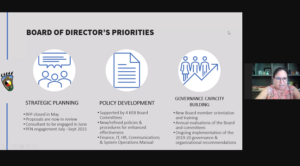Anishinabek First Nations that are not a part of the AES, will soon get an opportunity to join

By Marci Becking
ANISHINABEK NATION TERRITORY – First Nations that aren’t currently part of the Anishinabek Education System (AES) will have the opportunity to join the system as of April 1, 2023.
“We presented to each of the Anishinabek Nation four regions to share information on this opportunity for First Nations that are currently not part of the AES to review the agreements and the arrangements and discuss that opportunity to join the Anishinabek Education System at this time,” says Tracey O’Donnell, negotiator for the Kinoomaadizwin Education Body (KEB) who presented to Anishinabek Nation Chiefs-in-Assembly via Zoom on June 2. “What we are looking towards is having a ratification and working those First Nations in so they would be part of the system as of April 1, 2023. Letters will be coming to those First Nations with an invitation to schedule a meeting with the Anishinabek negotiations team so that we can come and present more information, more details on the system, and share with you what education would look like in your First Nation should you become part of the AES.”
The Kinoomaadizwin Education Body also has a new Education Director, Christine Dokis. Dokis gave an update to the Chiefs-in-Assembly on the progress the AES has made.
“We’re looking at the Capital Needs Assessment; we just received 28 applicants from the Niigaan Ghizhaami for 2021-22 and we are looking at a target date of June 9 to bring those recommendations forward from the Ministry [of Education] as well as the KEB,” says Dokis.
Other highlights include the AES scholarship and Award program, implementation of the 2021-24 multi-year action plan, AES Parent Council, various regional priorities, First Nation School Board Engagement Framework, and the Community Profile project.
“Language revitalization projects are definitely key in our plans,” says Dokis. “[As well as] addressing racism and inequity in schools, we just finished our annual forum in May and we’re having an upcoming Annual General Meeting June 23, so the AES and KEB annual report will be available at that time.”
O’Donnell says that now is the time to start negotiating the next Education Fiscal Transfer Agreement.
“The Education Fiscal Transfer Agreement is set to expire in 2023 so we’re getting a head start on that,” says O’Donnell. “We have started our process of consulting with our Regional Education Councils that are part of the Anishinabek Education System to secure their input, then we will be implementing a full consultation and engagement plan [this fiscal year]. Our negotiations will continue this year with the government of Canada and our next Fiscal Agreement we expect to be in place in time for April 1, 2023. During this time, we also have the opportunity to have additional First Nations become part of the Anishinabek Education System.”
The Kinoomaadizwin Education Body Board of Directors focussed on strategic planning this year.
“We’ve had strategic goals in place that have been worked on and implemented by the organization since it opened its door on April 1, 2018,” says O’Donnell. “We’re now looking at developing a more fulsome strategic plan, so work on that is starting. The Request for Proposals closed in May and we expect to begin our engagement with the Participating First Nations in the summer from July-September.”
The Board is also focussing some attention on policy development.
“We’re developing a full operations manual that talks about how the System operates with the First Nations, the Regional Education Councils and the Kinoomaadiziwin Education Body. The system structures and how they operate and work together and collaborate will be set out in more detail in writing. They are also focussing on governance capacity building – we are developing new board member orientation and training.”
For more information on the Anishinabek Education System or the Kinoomaadizwin Education Body, visit www.keb-aes.ca


